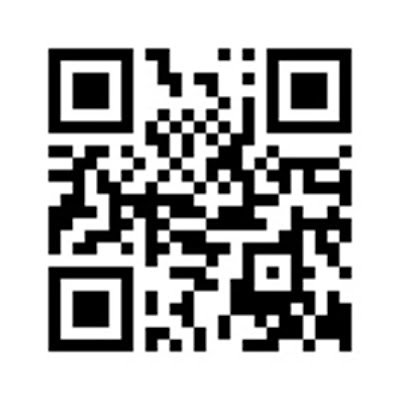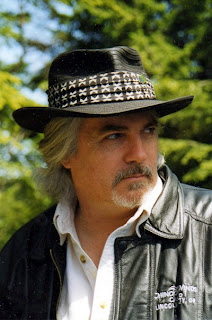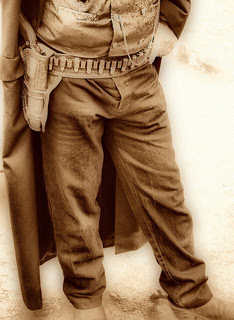There are a few blogs that consistently amaze me with the quality of their content and Joanna Penn's blog, The Creative Penn, is one of them. Today, quest poster Emily Craven explained how writers can use QR codes to 1) get more of your content in front of readers and 2) to enrich your readers experience of that content.
In this article I first talk about QR codes, what they are, and then discuss ways you can use them to put more of your content in front of readers and how to make that content as rich and interesting as possible.
Then, when (hopefully!) you've decided this is something you'd like to explore, I'll step you though how to generate your own QR codes and how to use them.
Ready? Let's go!
What The Heck Are QR Codes?
QR codes are those boxlike images which look like the misbegotten love-child of a Rorschach ink-blog and a bar code (see above). Their full name is Quick Response Code and it has been used extensively in recent years for advertising.
Formerly only for industrial uses, they have in recent years become common in consumer advertising and packaging, because the popularity of smartphones has put a barcode reader in everyone's pocket for the first time. As a result, the QR Code has become a focus of advertising strategy, since it provides quick and effortless access to the brand's website. (QR Code, Wikipedia)
We're Writers, Why Should We Care About QR Codes?
You might be wondering what, exactly, a QR code does. It's simple. It takes a surfer from one part of the internet to another part.
To your part.
For fans of Star Trek, it's like transporting people into your virtual gallery.
But what should you put on this webpage? It is, after all, a bit like your own virtual gallery.
Emily writes that one of the best ways to gain the trust of a prospective reader is to offer them audio or video content of yourself.
Not your cute-as-a-button dog, not a tasteful cartoon and NOT (you know who you are) your hand. You.
Emily writes:
It puts a face to the words, a personality to the letters, and while by its nature the video is generic, it seems personal and creates a deeper connection for the reader. They KNOW who you are, they’ve SEEN your face, you’ve reached out to them. ...I feel this is something of a confession, but I haven't yet created audio or visual content. So what I said, above, is a do-as-I-humbly-suggest kind of thing; it's not (alas) do-as-I-do. And, of course, everyone has different boundaries. If you'd rather traverse hot coals than make a video, then don't. In my opinion it's not worth that kind of stress.
This type of interaction between an author and a reader has never been done. Ever. Hardly anyone in the industry is taking advantage of this free technology and the digital space to connect on a deeper level. We have a chance to experiment while the publishers are frozen, a way to allow indies to come into their own and lead the field.
That said, for those of you considering such a step, here are a few articles on how to make audio files and videos.
Article on making an audiobook:
- How To Record Your Own Audiobook: Setting Up A Home Studio
Articles on making a video:
- How to Make a YouTube video
- YouTube: Creators' Corner
- YouTube: Create Videos
QR Codes: How Writers Can Use Them To Grow Their Audience
The problem with electronic books is that while you can download them you can't give them to a person you just met as a conference and sign the cover. Or sell them in bookstores.
Yes, you could generate a Smashwords coupon for the book and email it to your new friend, but you'd loose the intimacy of handing someone your book. Also, you can't sign an electronic file.
The solution: Book Cards!
This isn't my idea, Dean Wesley Smith blogged about it last year. The idea is that you do up a card (or bookmark) so it looks like your book, include the url of your book on Smashwords (or wherever) and print a coupon code on the card for getting the book free. You can even sign it!
I think that using QR Codes on the book cards, in addition to a printed URL, would be fantastic. No more tying a long URL into a browser.
But that's just the beginning. Embed a QR code at the end of a chapter and give readers the opportunity to visit a page on your website where you narrate new content (perhaps a 'lost' chapter), or give them a sample chapter from your latest book. You could even offer them a discount coupon for your next book.
Also, you could compile playlists for one or more of your characters and let your readers download them. See: Writing To Music: Knowing Your Characters.
QR Codes versus URLs
Let me play devil's advocate for a moment. What makes a QR code better than a good old-fashioned (heh) URL? After all, a reader, simply by clicking a hyperlink, can go to any page on the web, they don't need to download yet ANOTHER program and then take a picture.
Here's the gist of what Emily says:
1) When a reader clicks a hyperlink your story disappears and the new content replaces it. Since your using another devise, such as a smart phone, to access the bonus/new content, your story doesn't go anywhere and your reader doesn't lose their place in your book. Something that might just make them forget to come back!
2) Some e-readers can't access the internet. Without using QR codes the only way people would have of using the links you embedded would be to try and load your book file onto their computer, and how many busy folks are going to take that extra step?
Hopefully by this point you're convinced that QR codes are useful, or at least something you could experiment with. Now the question is: How do we make one?
How To Generate A QR Code
This part is as easy as falling off a greased log. Emily recommends delivr. Just take the URL of your choice and paste it in the the textbox, press go, and voila! You can download the image in the format of your choice (png, jpg, eps, or svg).
Here's the one I did
 |
| Figure 1 |
The URL I used was from Neil Gaiman's fabulous commencement speech at the University of the Arts this year:
http://www.youtube.com/watch?v=ikAb-NYkseI
I pasted that into the textbox at delivr and got the jpg that I've labeled Figure 1 (see above). Easy, right?
How To Read A QR Code
Emily Craven recommends a fabulous article: Desktop QR Code Reader. That's where most of the following information comes from.
Android
If you're using android the author recommends zxing, a open-source app.Apple
If you're using apple technology the article suggests the free QR Reader or (this is the one I use) you can use Qrafter (also free).Desktop
If you're using Chrome as your browser you can use a program called QR-Code Tag Extension and this will let you generate a QR code for the site you're viewing. Cool! By the way, if you're using Firefox for your browser, you can use an add-in called Mobile Barcode to do the same thing. (Update: I've been having trouble viewing the QR code for the page with Mobile Barcode. Just FYI.)Just go to whichever app store is relevant to your technology and download. I'll wait.
Back? Good. Open the app and use it to read the QR Code of your choice.
If you're using Qrafter on your iPhone or iPad just choose "Scan with Camera". If you like, you can use the QR code, just above, as a test. When the QR code is within view of the camera the app will automatically detect it and asks you if you'd like to go to the associated URL. Select "Go to URL" and you'll be looking at Neil Gaiman's speech on YouTube. (If you haven't listened to Mr. Gaiman's speech you might enjoy it, it is one of the more inspirational speeches I've heard.)
Conclusion: Are QR Codes The Best Things Since Sliced Bread?
Time will tell. It's a great technology. The next time I print my business cards I think I'm going to include a QR Code to my website on the back and I will make a book card for my next novel so I can give it out to folks in person.
What do you think of QR codes? Do you use them? If not, do you think you'll start?
Other articles you might like:
- Is Serial Fiction Profitable? Hugh Howey Says: Yes! Even With Absolutely No Promotion
- The MacGuffin: A Plot Device From Screenwriting
- Serial Fiction: Is It Profitable?
























